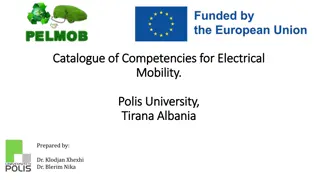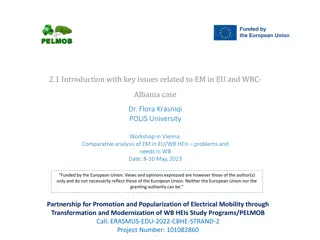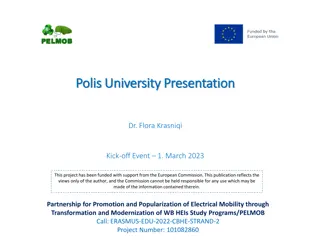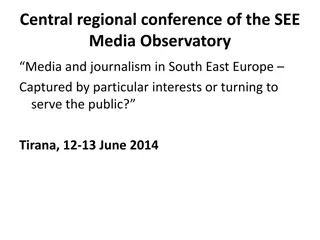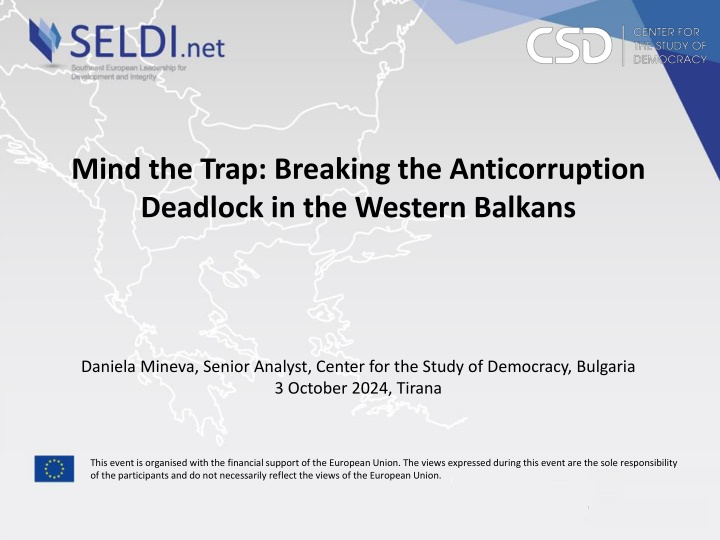
Challenges of Corruption in the Western Balkans: Insights and Solutions
Explore the prevalence of bribery and corruption in the Western Balkans, as highlighted by SELDI's research tools. Gain insights into the regional developments, citizen experiences, and susceptibility to corruption, shedding light on ongoing efforts to combat these issues.
Download Presentation

Please find below an Image/Link to download the presentation.
The content on the website is provided AS IS for your information and personal use only. It may not be sold, licensed, or shared on other websites without obtaining consent from the author. If you encounter any issues during the download, it is possible that the publisher has removed the file from their server.
You are allowed to download the files provided on this website for personal or commercial use, subject to the condition that they are used lawfully. All files are the property of their respective owners.
The content on the website is provided AS IS for your information and personal use only. It may not be sold, licensed, or shared on other websites without obtaining consent from the author.
E N D
Presentation Transcript
Mind the Trap: Breaking the Anticorruption Deadlock in the Western Balkans Daniela Mineva, Senior Analyst, Center for the Study of Democracy, Bulgaria 3 October 2024, Tirana This event is organised with the financial support of the European Union. The views expressed during this event are the sole responsibility of the participants and do not necessarily reflect the views of the European Union.
SELDIs Risk Assessment and Advocacy Tools SELDI supports evidence-based decision-making of public bodies through its tools: Corruption Monitoring System (CMS) Monitoring Anticorruption Policy Implementation (MACPI) Micro (Institutional) MACPI State Capture (SCAD), incl at sectoral level and promotes key reforms through reports, policy forums, briefings and face-to-face meetings with policy-makers.
Regional developments Western Balkans: democratic reforms and a considerable shift to a market economy over the last 20 years Progress uneven, driven by external support & civil society "Box-ticking" reforms tolerated due to weak conditionality Corruption progress varies: 10% bribery in Montenegro, 40% in Albania Political corruption remains considerable, perpetuating entrenched state capture networks
Bribery rates in the Western Balkan societies Montenegro Kosovo* BiH Serbia N. Macedonia Albania 60% 50% 40% 30% 20% 10% 0% 2014 2016 2019 2021 2023 Share of the population 18+ who have been asked to give and have given a bribe/money/favour/gift. Source: SELDI CMS, 2023. * The designation "Kosovo" is without prejudice to positions on status, and is in line with UNSCR 1244/1999 and the ICJ Opinion on the Kosovo declaration of independence.
Citizens experience: bribing is mostly a function of pressure from officials 60% 52% 50% 40% 40% 31% 30% 26% 25% 24% 23% 18% 20% 11% 11% 10% 7% 10% 0% Albania BiH North Macedonia Serbia Montenegro Kosovo Reported pressure from officials Share of individuals who bribed officials Source: SELDI CMS, 2023. * The designation "Kosovo" is without prejudice to positions on status, and is in line with UNSCR 1244/1999 and the ICJ Opinion on the Kosovo declaration of independence.
Susceptibility to corruption In 2023/2024, Albanians were the most vulnerable to corruption victimisation 80% of the Albanian population is susceptible to accept or offer a bribe The least vulnerable are people in Montenegro where only 48% are susceptible to corruption. However, there has been a slight decline in the propensity of the population in Western Balkan countries to either accept or offer a bribe compared to 2001, which can be regarded as a success of corruption awareness policies. * The designation "Kosovo" is without prejudice to positions on status, and is in line with UNSCR 1244/1999 and the ICJ Opinion on the Kosovo declaration of independence.
Anticorruption optimism has changed little over the past decade * Share of individuals believing that corruption can be substantially reduced Source: SELDI CMS, 2023. * The designation "Kosovo" is without prejudice to positions on status, and is in line with UNSCR 1244/1999 and the ICJ Opinion on the Kosovo declaration of independence.
Anticorruption policies and institutions Missed Opportunities: Window for bolder reforms around 2010 closed, leading to imitation and stagnation. Fast-Tracking Legal Reforms: EU flag procedure bears the risk of bypassing public consultations, weakening oversight. Anti-CorruptionStrategies Lack Impact, focus and measurable goals, and do not address political corruption. Foreign Subversion Ignored: Strategies do not address risks of foreign influence through corruption. Weak Anti-Corruption Bodies: Repurposed by oligarchic circles for whitewashing corrupt schemes and persecuting opponents. Judicial Capture: Selection and promotion of judges/prosecutors influenced by politics and private interests. Low Enforcement: Weak deterrence effect with enforcement gap exceeding 99%.
From soft politics to hard assistance: how to recalibrate EU anticorruption assistance The return on investment of EU assistance has been less than expected. The overly technical approach failed to foster the political transformation needed to overcome state capture. Sources: European Commission and SELDI CMS, in SELDI, Mind the Trap: Breaking the Anticorruption Deadlock in the Western Balkans, 2024.
External assistance and national measures could be effective if they proceed from an assumption of state capture The mechanism of state capture
The mapping of state capture should be mainstreamed into assistance design An algorithm for assessing the risk of capture of EU assistance In the 2020 Economic and Investment Plan Western Balkans and the May 2024 approval by the Council of the EU of the Reform and Growth Facility for the Western Balkans - improved rule of law cannot be both an objective and a condition of assistance. for the Source: CSD, 2024; SELDI, Mind the Trap: Breaking the Deadlockin the WesternBalkans, 2024 . Anticorruption
Recommendations Focusing on impact: Result-oriented targets to be introduced in all Regular Reports on Enlargement and EU s Rule of Law Report; Improving the legal base: The proposal for a new EU Directive combating corruption should be adopted swiftly, leading to the harmonization of the legal definitions, the criminalization of corruption crimes. A challenge is to define in legal terms state capture and strategic corruption . The EU should consider reinforcing US Magnitsky-style sanctions in the Balkans. Enhancing investigation and prosecution of high-level corruption and sanctions evasion: Oversight of AMLA, in cooperation with EPPO and U.S. Financial Crimes Enforcement Network. The mandate of EPPO should include the violations of EU sanctions against Russia. More efficient prevention and corruption risk assessment: Through the use of big data and AI, interlinking of national public registers, EU-level datahubs, cross-border exchange of information (e.g. RAI s International Treaty on Exchange of Data for the Verification of Asset Declarations where the EU could become a key member).
Recommendations Involving civil society in monitoring and addressing malign influence, state capture, disinformation. Implementing strict investment screening mechanisms: All countries, both EU and non-EU member states, should break away from the tradition of welcoming unchecked financial flows from authoritarian regimes and local oligarchs. Capacity building: in methods for tracking illicit finance across borders and detecting financial crimes, performing detailed checks of asset declarations, countering money laundering, introduction of e-auditing. Showing a stronger commitment to the European future of the Western Balkans: The European Commission and the local EU Delegations could expand their direct interaction with policy-makers and civil society in the region through informal Councils, regular Ministerial-level meetings, technical committees, and Commission working groups, as foreseen in the 2018 EU Strategy on the Western Balkans.
Thank you ! www.seldi.net www.csd.eu




